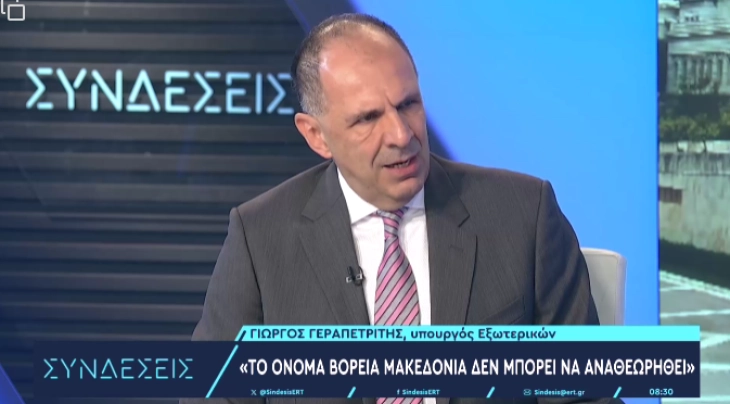FM: Greece has means for more pressure at bilateral and international level if North Macedonia resumes current policy
- If North Macedonia keeps on maintaining this policy, being directly against international agreements, Greece has the means at disposal to exert even greater pressure, means that are bilateral as well as multilateral at the level of international organizations, Greek Foreign Minister Giorgos Gerapetritis said in an interview with Greece’s ERT TV.

Athens, 22 July 2024 (MIA) – If North Macedonia keeps on maintaining this policy, being directly against international agreements, Greece has the means at disposal to exert even greater pressure, means that are bilateral as well as multilateral at the level of international organizations, Greek Foreign Minister Giorgos Gerapetritis said in an interview with Greece’s ERT TV.
The Prespa Agreement, he reiterated, had been ratified by the two parliaments, thus having legal obligations that cannot be changed by neither of the two countries.
“The Prespa Agreement itself clearly states that the name issue, that is the name North Macedonia, cannot be changed neither with an agreement by the parties. It is a provision that stays forever. At this moment, there is clear violation by the political and state leadership. The claim has no legal grounds that any political or state leader can use the other name for their country informally because in reality it is direct violation. A president or a prime minister of a country cannot refer to a private autonomy during public appearances. This is not in line neither with the national constitutional law nor with international law,” stated Gerapetritis.
He also reiterated that according to them “the agreement has notable political and legal issues”, but the document is legally binding for everyone.
“I’ve made huge efforts to inform fully all our partners and all international organizations. What I can tell you is that at this moment there is serious concern over North Macedonia’s position. We all understand that if this policy resumes, which directly opposes the international agreements, considered the foundation of the international security architecture, then Greece has the means to exert even greater pressure, means that are bilateral and multilateral at the level of international organizations,” Gerapetritis told ERT.







